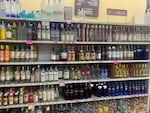Oregon Attorney General Ellen Rosenblum announced on Friday she will investigate whether there was any criminal wrongdoing by top managers at the Oregon Liquor and Cannabis Commission who diverted specialty bourbons away from public consumption for their own personal use.
An internal OLCC investigation revealed a long-standing practice in which liquor commission staff, including director Steve Marks, sent rare bottles of bourbons to certain stores where they could purchase it, violating state ethics laws and denying the general public access to rare, highly priced brands. One employee said the practice was widespread — and included state lawmakers.
On Wednesday, Gov. Tina Kotek sent a letter to members of the liquor and cannabis commission calling the conduct “wholly unacceptable” and asking commissioners to fire the five managers who admitted to the practice. Kotek had already asked Marks to step down before learning of the internal OLCC investigation.
Oregon’s system for regulating the sale of alcohol is convoluted. Here’s a quick primer on how that system works and how it led to this scandal.

FILE: In this photo from a year ago, Russian made vodkas were no longer for sale at Rose City Liquor Store in Northeast Portland because of the war in Ukraine. An internal OLCC investigation revealed a long-standing practice in which liquor commission staff, including director Steve Marks, sent rare bottles of bourbons to certain stores where they could purchase it, violating state ethics laws and denying the general public access to rare, highly priced brands.
Courtney Sherwood / OPB
Oregon is considered a “control state” when it comes to the buying and selling of liquor. What does that mean?
Oregon heavily regulates when and where liquor can be sold. While beer and wine can be purchased in a supermarket or a convenience store, hard alcohol is sold in liquor stores operated by the state and managed by liquor agents who are selected by OLCC commissioners. There are 248 liquor stores in Oregon distributed throughout the state on the basis of population. The state is in charge of determining how many stores there are, where they are located, purchasing the liquor and distributing it as well.
There has been a push to privatize liquor sales in the past, what are some of the arguments for keeping it heavily regulated?
If you walk into a liquor store in Gold Beach, Pendleton or Portland, you pay the same price for the same bottle. That price is not decided by the demand of the market like in other states. Some believe that is a benefit to Oregon’s regulatory system.
Mark Pettinger, a spokesman for the OLCC, said people also like that the number of liquor stores is limited and based on population. There are about nine liquor stores per 100,000 people in the state, he said. The state liquor stores are also required to save shelf space for local craft distillers, which gives newer companies a chance to gain supporters.
But there has been an effort recently to move away from a state system and toward privatization. Why?
The Northwest Grocery Association has tried several times to ask voters to allow grocery stores to sell hard liquor. This scandal could help bolster their arguments. Amanda Dalton, the lobbyist for the grocers, said the latest news further shows the current system is antiquated and should be changed.
OLCC has a lottery system for some of these very high-end bottles of bourbon. How does that work?
For rare bottles, where there is very limited quantity, OLCC holds a “chance to purchase” raffle. The program started in 2018. The odds are dependent on how many bottles are being raffled each year. The OLCC raffles bottles left after sending some to liquor stores, bars and restaurants. The odds of being able to purchase a bottle of Pappy Van Winkle bourbon, for example, recently was 1 in about 5,000. One liquor store owner, who declined to give his name, noted that liquor store employees are not eligible to enter the raffle.
What happens next?
Kotek has asked members of the Oregon Liquor and Cannabis Commission, a board she appoints, to install new leadership and remove the managers who were implicated in the scandal. None of the commissioners agreed to speak to OPB. They have a meeting scheduled for next week.
Under state statute, the commissioners have hiring and firing authority over OLCC managers. The governor’s staff has not yet heard that anyone has been fired or quit as of Friday afternoon.